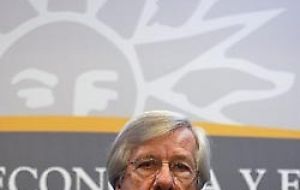MercoPress. South Atlantic News Agency
Uruguay July inflation eases, but above 2008 target
 Minister Astori, confident about containig inflation
Minister Astori, confident about containig inflation Uruguay's July consumer prices index CPI marked 0.45%, the lowest since last April, accumulating 5.91% in the first seven months of 2008 which, according to analysts makes it difficult to keep to the original Central Bank estimates of 3 to 7% for the twelve months.
The twelve months to July consumer inflation was 8.02%, lower than June's 8.42% signaling a relief to the sustained growth since April. However core inflation, excluding food and energy in July was 0.7% and 7.6% in the last twelve months. Analysts point out that even when the inflationary tendency has reverted the coming round of salary negotiations could be threatening as well as if the government decides to adjust public utility rates which have been deliberately contained to help combat inflationary pressures earlier in the year. This view seems to be confirmed by the fact that the so called non transable goods, which are to a great extent immune to outside influence, have risen 0.8% in July and 8.9% in the last twelve months. But transable goods were down 0.2% in July accumulating 6.5% in the last twelve months. During July food and beverage dropped 0.02%, the first time in 2008 this happens. An abundant supply of fresh vegetables and fruit was decisive. Clothing and foot wear also decreased on average 1.85%. Most of July's inflation, 70%, can be attributed to the increase in transport and communications, 1.62% and in housing and home fuels. "Inflation remains an unsolved problem", according to Marcelo Sibille an economist from consultants KPMG Uruguay, who believes the original 7% target for the year "is not achievable". Sandra Perez Ramos from Deloitte Uruguay argues that July's index was helped by a seasonal lowering of fresh food prices, but underlying inflation "remains solid". According to Ramon Pampin from Price Waterhouse Coopers lower international oil prices will be helpful but "salary increases in several sectors of the economy and even with food prices stabilized, inflation is still very much alive". Regarding inflation for lower income families, July showed 0.39% according to Uruguay's School of Economics. This in practical terms means that an average family with two children to purchase a monthly basic basket of goods and services needs the equivalent of approximately 1.200 US dollars (One USD equal to 19 Uruguayan pesos). The CPI in the first seven months of the year for this group reached 5.46% and 7.69% in the last twelve months, down from 8.34% to June. Nevertheless Uruguay's Economy minister Danilo Astori confirmed that fiscal and inflation targets for 2008 remain "unchanged" because the economy is growing at a "sustained rate". "The overall tendency of a balanced economy is consolidating and we feel that the 2009 evolution will also be in line with our targets", underlined Astori.




Top Comments
Disclaimer & comment rulesCommenting for this story is now closed.
If you have a Facebook account, become a fan and comment on our Facebook Page!